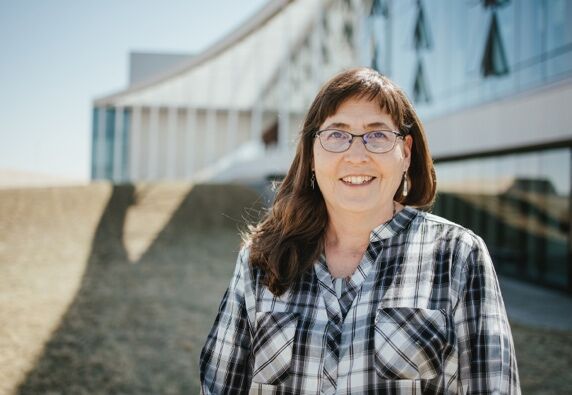U of L researcher leading the fight against blackleg of potato
Posted on 13 May 2021 by Contributed
Dr. Michele Konschuh
Dr. Michele Konschuh, a research associate in the Department of Biological Sciences, is leading a study to help ensure Alberta’s potato industry stays healthy, thanks to a three-year grant from the province’s Results Driven Agriculture Research (RDAR) fund and in-kind support from stakeholders in the potato industry.
“We’re going to try a biocontrol approach and some information and diagnostics to see if we can help the industry stay strong,” says Konschuh. “We have a very good potato industry here and we want to keep it that way. We’re very grateful for the support from industry and RDAR.”
The potato industry comprises about 55,000 acres in Alberta. The majority of potatoes are grown for processing, with about 13,000 to 15,000 acres devoted to growing seed potatoes. The industry is worth nearly $1 billion to the province’s economy.
Blackleg, one of numerous seed-borne diseases that have been identified in potato production around the world, is caused by Pectobacterium and Dickeya bacteria. Of the two, Dickeya is especially aggressive and has reduced yields by 20 to 25 per cent in Europe and Israel, where the pathogen is established. It causes a blackening of the plant stem and that decay prevents nutrients from getting to the tuber and water from going up to the plant.
“We absolutely have blackleg, but blackleg is a lay person’s term for the disease,” says Konschuh. “The one we have in Alberta is caused by Pectobacterium species and it’s fairly common in all potato-growing regions. At this time, we have no Dickeya and we want to keep it that way.”
Because no pesticides are available to prevent blackleg, seed potato growers rely on agronomic practices that include cleaning and sanitizing equipment between seed lots, cleaning storage units and rotating crops. One of the trickier aspects of blackleg is that it can remain latent in the potato tuber. If planting is done under warm and dry conditions, the disease may never appear. However, in a cool, wet spring the disease can show up.
“We want to develop solutions both to prevent that latent infection and also to address the disease in the field,” says Konschuh.
Konschuh and her collaborators, Drs. Larry Kawchuk and Jonathan Neilson from Agriculture and Agri-Food Canada, will use a multi-pronged approach that includes an information campaign outlining best practices for seed growers and sharing findings from their research.
The researchers also plan to investigate the rapid diagnostic tools available on the market and potentially develop additional tools to detect blackleg early. Such tools would allow producers to obtain a diagnosis when they see a suspicious plant in the field instead of having to wait for laboratory results.
In addition, the scientists will investigate the potential of biocontrol agents — bacteriophages and endophytes. Bacteriophages are viruses of bacteria that can kill or dissolve bacteria. Endophytes are organisms that live within a plant and can have beneficial properties, like the good bacteria that live in the gut.
The project will focus on seed potatoes to make the most impact with a smaller number of acres. Keeping the disease out of seed potatoes will help prevent it from showing up in commercial fields. This will help ensure seed growers maintain the high-quality standards they’ve already achieved and potato growers continue to generate high-yield crops.
“We don’t just supply seed domestically to other parts of Alberta for the commercial industry; we’re the largest exporter of seed potato in Canada,” says Konschuh. “Southern Alberta potato growers have a really good reputation for producing high-quality potatoes for value-added processors.”
The research project will also provide training opportunities for students to help process samples from the field, identify disease organisms and work on the biocontrol agents.
“We need the help and we would also like to work on training the workforce,” says Konschuh. “We need skilled people joining the agricultural industry.”
Dr. Michele Konschuh
Leave a Reply
You must be logged in to post a comment.
